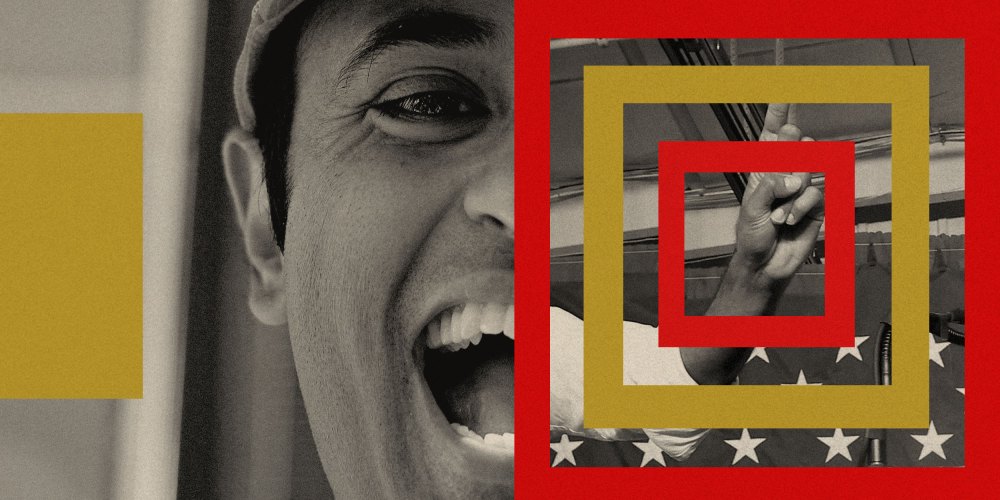The first GOP primary debate features 8 candidates — and one Trump-sized elephant in the room. Are any of the hopefuls fit to be president? Read this installment of MSNBC’s 2024 profile series and find out.
Vivek Ramaswamy’s White House campaign has been the outsider success story of the Republican presidential primary season. Ramaswamy, a 37-year-old former biotech executive with no political experience, leaped from fledgling pundit last year to third place in primary polls this summer, outstripping more prominent Republican candidates like former Vice President Mike Pence.
Ideologically speaking, Ramaswamy has positioned himself in close alignment with or to the right of former President Donald Trump on most policies, and he has suggested that he’ll succeed where Trump failed with an “America First 2.0” policy agenda. In many ways, that places him in a similar camp with Florida Gov. Ron DeSantis, who has embraced a war on so-called wokeness in a bid to appeal to the core MAGA crowd.
Ramaswamy is a full-fledged MAGA zealot in the form of a sunny debate bro.
Yet at the same time, the way Ramaswamy has presented his candidacy also has some distinct features. Whereas DeSantis has been reluctant (until recently) to engage with the mainstream media, Ramaswamy has relished a “say yes to anything” media strategy, engaging directly — and critically — in interviews with major non-conservative media outlets, such as NBC News, CNN and MSNBC. Ramaswamy exudes confidence with his smooth rhetorical delivery and his ability to debate people in ideologically hostile territory, in a way that is somewhat reminiscent of Pete Buttigieg in the 2020 presidential primaries. Ramaswamy’s rhetoric is also couched politely in the language of unity and compassion, which can disguise his reactionary policies as a warmer, kinder, big tent-style conservatism. Make no mistake: Ramaswamy is a full-fledged MAGA zealot in the form of a sunny debate bro.
Like many right-wing populists, Ramaswamy has elite credentials. He studied at Harvard for his undergraduate degree and attended Yale Law School (where he met JD Vance, another man who would move from finance into right-wing politics). He worked at a hedge fund for many years, and then he founded a pharmaceutical company that helped him make a huge sum of money. Notably, in all his self-mythologizing, Ramaswamy tends not to linger on the fact that his company failed, in a rather spectacular way, to bring an Alzheimer’s drug to market. Forbes estimates his net worth at over $600 million, and he has lent his own campaign millions of dollars.
Ramaswamy’s first major foray into political commentary was his 2021 book, “Woke Inc.,” in which he contends that corporations cynically cloak themselves in social justice politics. Many leftists would agree with that premise, but Ramaswamy’s fixation on liberal corporate hypocrisy is more of a gotcha than a coherent theory of the world, and it’s certainly not a serious reckoning with concentrated wealth. He criticizes socially conscious investing both as inappropriately political and as window dressing, but his solution embraces investment strategies that completely disregard corporations’ impacts on the world, and he champions shareholders’ financial interests above all. When The New Yorker’s Sheelah Kolhatkar pressed him on the question of how extreme concentration of wealth corrupts politics, he appeared bored and didn’t engage other than to imply it wasn’t a major problem.

The book made Ramaswamy a regular on Fox News and other right-wing media outlets. In February, he announced his bid for the White House on former Fox News host Tucker Carlson’s show.
Much like most of the MAGA political class, Ramaswamy centers his opening bid on resentment of rising anti-bigotry in mainstream liberal American culture. In his campaign video introducing himself to voters, Ramaswamy claims that his personal success would have been “impossible” had he been born just 20 years later, implying that today’s “woke” culture is at odds with meritocracy. America is plagued by a “national identity crisis,” Ramaswamy warns, in which “faith, patriotism, hard work and family have disappeared” and have been replaced by “one secular religion after another, from Covidism to climate-ism and gender ideology.”












